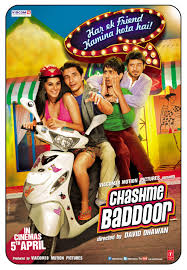Bursting with laughter, quirky moments, and a charm that reflects early Bollywood cinema, this film brings together Farooq Shaikh, Deepti Naval, Rakesh Bedi, and Ravi Baswani in a delightful classic comedy. Set in 1981 in Delhi, the film embraces a light-hearted take on friendship, love, and the ups and downs of young adult life. Directed by Sai Paranjpye, it falls under the comedy-drama genre, blending humor with a hint of romance and a keen insight into youthful aspirations and insecurities in a pre-modernized India.
The story follows three carefree college friends – Siddharth, Omi, and Jomo – who share a cramped little apartment and find themselves entangled in humorous situations in their quest for love and fun. While Omi and Jomo are the resident Casanovas, eager to win over any new girl in town, Siddharth is a quieter, more introspective character who focuses on his studies. Things take a comedic turn when Neha, a charming new neighbor, enters the picture. Omi and Jomo’s comical and exaggerated attempts to woo Neha fail spectacularly, only for her to end up developing a connection with Siddharth. Their budding romance, however, becomes a bone of contention for Omi and Jomo, who then scheme to disrupt their relationship, leading to a series of hilarious misunderstandings and ultimately a heartwarming resolution that speaks to the power of friendship and love.
The performances are truly the film’s lifeblood, with Farooq as Siddharth standing out in his restrained, nuanced portrayal of the idealistic and reserved young man. His chemistry with Deepti, playing Neha, is understated yet genuine, providing an authentic charm that gives their relationship a grounded feel amidst all the comedic chaos. Rakesh and Ravi as Omi and Jomo, respectively, are unforgettable in their roles as the meddlesome but well-meaning friends. Their physical comedy and impeccable timing add an infectious energy to the film, pulling viewers into their antics with every exaggerated expression and perfectly timed line. Deepti’s Neha, a graceful and strong-willed character, contrasts well with the lively personalities around her, and her interactions with Farooq create a grounded contrast to the slapstick, light-hearted moments. The cast’s synergy gives the movie a natural, enjoyable rhythm, and each actor makes their character memorable, leaving an enduring impression long after the credits roll.
Sai Paranjpye’s direction shines through as she masterfully balances comedy with a subtle commentary on friendship, love, and the complexity of young relationships. Her portrayal of life in 1980s India is refreshingly unpretentious, focusing on the simple joys and struggles of everyday life rather than embellishing or exaggerating them. Paranjpye maintains a pace that keeps the story lively without feeling rushed, allowing moments of humor to flow organically. She also captures the spirit of the time with finesse, showing college students sharing cramped spaces and bonding over small victories, with each scene carefully directed to build an endearing picture of camaraderie and ambition. Her direction is most notable in her ability to capture Delhi’s unique vibe, which becomes a character in its own right, further enhancing the setting’s authenticity.
The soundtrack composed by Raj Kamal plays a pivotal role, enhancing both the romantic and comedic undertones of the movie. Songs like “Kali Ghodi Dwar Khadi” and “Kahan Se Aaye Badra” become almost thematic pillars, giving a nostalgic yet lively feel that connects well with the film’s ambiance. The use of music not only supports the lighthearted scenes but also adds emotional depth during the quieter, more intimate moments. The lyrics by Indu Jain are witty and add a layer of playfulness that resonates well with the youthful energy of the film. The background score is subtle but effective, underlining the comedic and romantic beats without being intrusive, which helps maintain the film’s light-hearted tone.
Cinematography by Virendra Saini is simple yet effective, capturing the quaint charm of 1980s Delhi. The use of natural lighting and straightforward shots reflects the film’s unembellished approach to storytelling, keeping the focus on the characters and their interactions. Saini’s lens captures the essence of old Delhi, with bustling streets, local cafes, and college campuses that reflect the era’s authenticity. The camera work during the comedic scenes is particularly commendable, as it enhances the slapstick humor without relying on excessive close-ups or forced angles. Instead, it captures the cast’s physical comedy in a way that feels natural, allowing the humor to emerge organically from their expressions and movements.
One of the film’s most unique aspects is its dialogue. The humor is driven not only by situations but also by the clever, witty lines that the characters exchange. The screenplay brilliantly uses colloquial language and humorous metaphors that bring out the character’s personalities and make the comedy feel relatable and spontaneous. Jomo’s exaggerated poetic lines and Omi’s overly dramatic wooing methods stand out, adding layers to their personalities while giving the audience an insight into their hilariously misguided confidence. Each line feels carefully crafted to reflect the character’s quirks, and it’s in these dialogues that much of the film’s charm lies.
Overall, the movie is a delightful ride into an era of simplicity and innocence, brought to life through lively characters, humorous situations, and a heartwarming story about friendship and love. Its charm lies in its authenticity, with performances that make the characters feel like friends we all know. Sai Paranjpye’s direction and the cast’s performances, along with the delightful music, make this film a memorable experience that transports viewers back to a time when life was simpler and love, though complicated, was still refreshingly straightforward. For anyone looking for a feel-good classic that showcases Bollywood’s rich history of character-driven comedies, this film is a must-watch. It’s a reminder that sometimes, in cinema as in life, the simple things leave the most lasting impressions.







